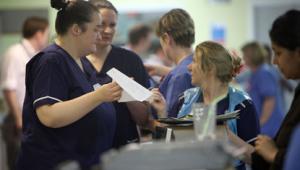Shortages will increase from over 100,000 at present to almost 250,000 by 2030, but without effective workforce planning this could rise again to 350,000, according to analysis by three health groups
A report published by think-tanks the King’s Fund, Nuffield Trust and the Health Foundation comes ahead of the NHS 10-year plan, which will set out how the recently announced £20.5bn funding boost will be spent.
A shortage of 250,000 NHS staff would mean one in six health service posts are short of staff, according the report.
The report noted that the NHS has struggled to recruit in recent years, in part because of “an incoherent approach to the NHS workforce at a national level” and “restrictive immigration policies that have been exacerbated by Brexit”.
The groups urged NHS leaders drawing up the 10-year plan to address the immediate workforce shortages and deliver a sustainable workforce over the next 10 years.
The report said: “If substantial staff shortages continue, they could lead to growing waiting lists, deteriorating care quality and the risk that some of the £20.5bn secured for NHS frontline services will go unspent: even if commissioners have the resources to commission additional activity, healthcare providers may not have the staff to deliver it.”
Richard Murray, director of policy at the King’s Fund, said: “The NHS cannot meet increasing demand from patients without the workforce to staff services.
“Unless the NHS long-term plan is linked to a credible strategy for recruiting and retaining staff, there is a real risk that some of the extra funding pledged by the government will go unspent and waiting lists for treatment will continue to grow.”
The report said that funding for education and training dropped from 5% of health spending in 2006-7 to 3% in 2018-19, the equivalent of a £2bn drop.
In 2017-18, NHS trusts spent £5.5bn on temporary staff to cover vacancies and other short-term absences, accounting for over 10% of total pay costs, the report said.
Candace Imison, director of policy at the Nuffield Trust, said: “The NHS has a woeful track record in ensuring that the health service has the right numbers of staff it needs in all the right places.
“This has now reached a critical juncture: unless the NHS long-term plan puts in place urgent and credible measures to shore up the workforce both in the short term and in the longer term, it risks being a major failure.”
The think-tanks said that Brexit has created risks in both the short and medium term. A net inflow of nurses from the EU into the NHS has turned into a net outflow, and between July 2017 and July 2018 1,584 more EU nurses and health visitors left their roles in the NHS than joined.
Many of the same issues are affecting the social care workforce, the report said. Around one in 10 social worker and one in 11 care worker roles are unfilled, and the number of vacancies stands at 110,000.
“Any strategy for shoring up the NHS workforce cannot be viewed in isolation from the need to invest in and support the social care workforce,” it added.
A recent study estimated that England could experience a shortfall of 51,000 nurses by 2021.











